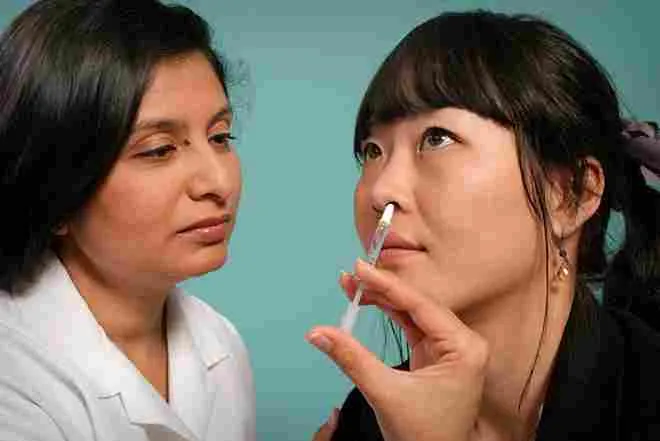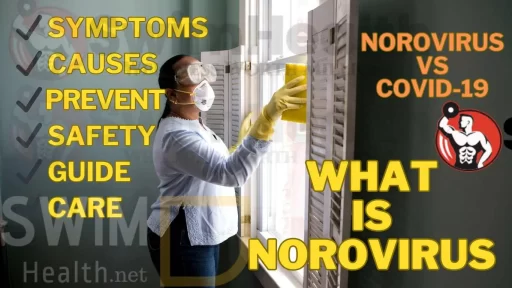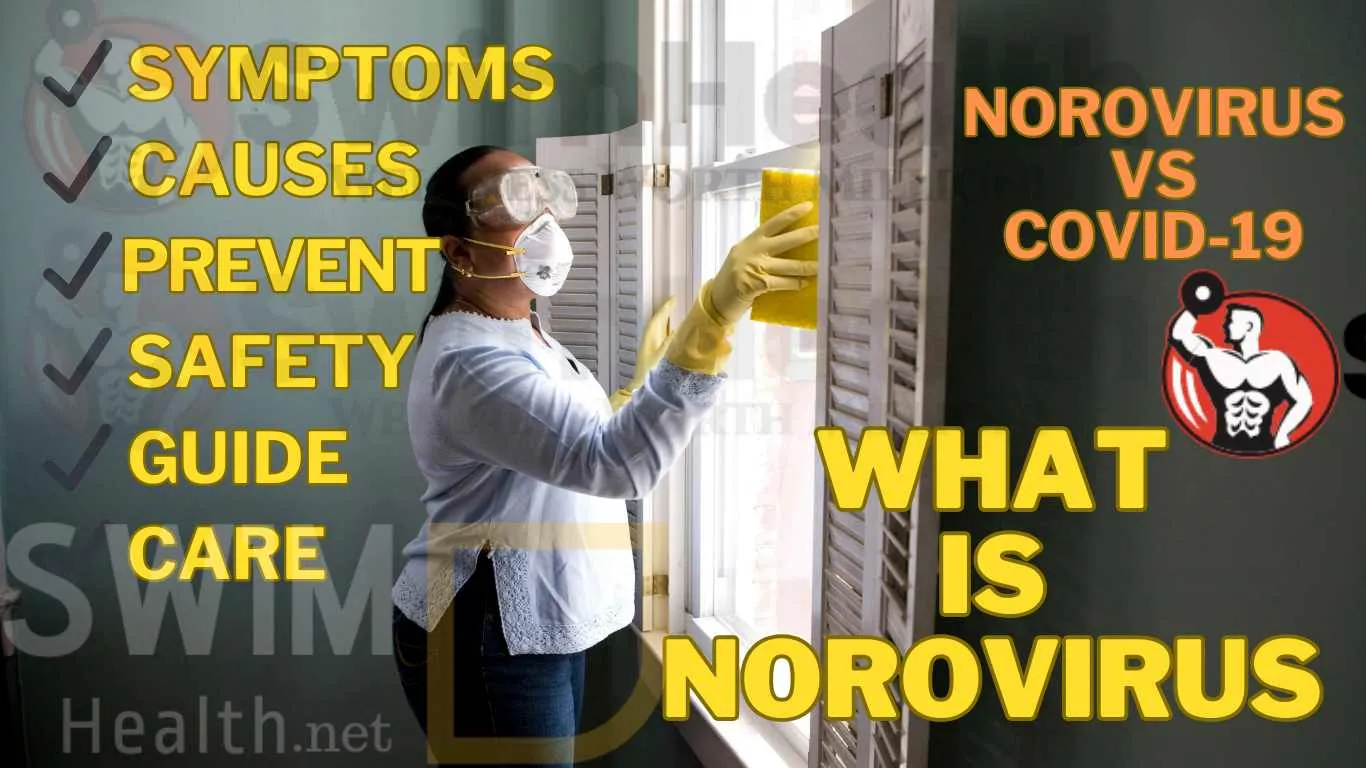Welcome to the ultimate discussion on Norovirus, the unwelcome guest that no one wants at their party! From symptoms to prevention, buckle up as we delve into everything you need to know about this pesky stomach bug. So, grab a cup of tea (and maybe some hand sanitizer) and let’s navigate through the world of Norovirus together!
What is Norovirus?
Table of Contents
Wondering what exactly norovirus is? It’s a highly contagious virus that causes inflammation in the stomach and intestines, leading to symptoms like vomiting and diarrhea. The virus can spread quickly in crowded places like schools, cruise ships, or nursing homes.
Norovirus, often dubbed the “winter vomiting bug,” is a highly contagious virus that can wreak havoc on your gastrointestinal system i.e can cause gastroenteritis. It’s notorious for causing sudden and severe bouts of vomiting, diarrhea, stomach cramps, and nausea. The symptoms can hit you like a ton of bricks and leave you feeling utterly drained. It’s the leading cause of foodborne illness outbreaks worldwide and can spread rapidly in closed environments like cruise ships or schools. This pesky virus affects people of all ages and can lead to uncomfortable symptoms such as nausea, vomiting, diarrhea, and stomach cramps.
Transmission of Norovirus occurs through close contact with infected individuals or by consuming contaminated food or water. This sneaky virus can survive on surfaces for days, waiting to infect its next victim with just a touch. Prevention is key when it comes to Norovirus – proper hand hygiene, disinfecting surfaces regularly, and avoiding sharing personal items are crucial steps in safeguarding yourself against this nasty bug.
Despite its small size, norovirus packs a punch when it comes to causing havoc on your digestive system. The virus thrives in areas where people are in close contact with each other or where hygiene practices may not be optimal. Understanding what norovirus is essential for preventing its transmission and minimizing its impact on your health.
Remember to wash your hands frequently, avoid contaminated food or water sources, and practice good hygiene habits to reduce the risk of contracting this new virus 24. Stay informed about this sneaky bug to protect yourself and those around you from its unpleasant effects.
Stay tuned as we unravel more insights into diagnosing the noro virus, managing symptoms effectively, and understanding how to navigate life during an outbreak. Let’s dive deeper into this viral world!
How they Transmit?

Concerned about complications from norovirus and how they transmit? While most people recover without any long-term issues, severe dehydration can occur in vulnerable populations such as young children or older adults. Seeking medical attention if symptoms persist is crucial for proper management. Norovirus spreads through contaminated food or water, close contact with an infected person, or touching surfaces contaminated with the virus. Practicing good hygiene like washing hands regularly can help prevent its transmission. This viral infection spreads rapidly through contaminated food or water, close contact with an infected person, or touching surfaces contaminated with the virus. The symptoms typically include sudden onset of vomiting, diarrhea, stomach cramps, and nausea.
While norovirus infections are usually mild and resolve on their own within a few days, they can be particularly severe in young children, older adults, and individuals with weakened immune systems. Proper hygiene practices like frequent handwashing can help prevent the spread of this highly infectious virus.
Understanding noro virus is crucial in taking necessary precautions to protect yourself and others from this common illness that can cause significant discomfort.
Symptoms and Causes
Norovirus is notorious for causing sudden onset of symptoms that can leave individuals feeling miserable. The most common signs include nausea, vomiting, diarrhea, stomach cramps, and sometimes fever. These symptoms typically appear within 12-48 hours after exposure to the virus.
The cause of norovirus infection is primarily through contaminated food or water, close contact with infected individuals, or touching surfaces contaminated with the virus. The virus is highly contagious and can spread rapidly in crowded places like schools, cruise ships, and nursing homes.
In addition to physical discomfort, noro virus can also lead to dehydration due to excessive fluid loss from vomiting and diarrhea. This makes it crucial for affected individuals to stay hydrated by drinking plenty of fluids while they recover from the illness.
It’s essential to be vigilant about hand hygiene and avoid sharing personal items if you suspect you may have been exposed to noro virus. Taking preventive measures can help reduce the risk of contracting this unpleasant infection.
Diagnosis and Tests
When it comes to diagnosing norovirus, healthcare providers typically rely on the symptoms reported by the affected individual. Since noro virus shares symptoms with other illnesses, a definitive diagnosis is often confirmed through laboratory tests.
One common test used to detect noro virus is a stool sample analysis, where the virus can be identified through specific molecular methods. Additionally, blood tests may be conducted to rule out other possible causes of similar symptoms.
It’s important for individuals experiencing symptoms like nausea, vomiting, diarrhea, and stomach cramps to seek medical attention promptly for an accurate diagnosis. Early detection can help in managing the illness effectively and preventing further spread to others.
Remember that proper hygiene practices such as handwashing and sanitizing frequently touched surfaces remain crucial in controlling the transmission of norovirus within communities.
Management and Treatment
When it comes to managing and treating norovirus, the focus is primarily on symptom relief. Since norovirus is a viral infection, antibiotics are not effective against it. Instead, treatment involves addressing the symptoms such as nausea, vomiting, diarrhea, and stomach cramps.
For most people with norovirus, the illness tends to resolve on its own within a few days with rest and hydration being key components of management. It’s important to stay well-hydrated by drinking plenty of fluids like water or oral rehydration solutions. In severe cases where dehydration becomes a concern, medical intervention may be necessary.
Over-the-counter medications can help alleviate some symptoms like anti-nausea medication for vomiting or anti-diarrheal medication for diarrhea. However, it’s essential to consult with a healthcare provider before taking any medication to ensure proper dosage and suitability based on individual circumstances.
In more severe cases or if complications arise due to noro virus infection, seeking medical attention is crucial for appropriate care and monitoring. Be proactive in managing symptoms while allowing your body time to fight off the virus naturally.
Prevention

Thinking about prevention methods for norovirus? Proper handwashing, disinfecting surfaces, avoiding shared food utensils, and staying home when sick can all help reduce the risk of infection. Stay informed and take proactive steps to protect yourself and others from this common viral illness. Preventing norovirus infection is crucial in maintaining good health and preventing outbreaks. One of the most effective ways to prevent norovirus is by practicing good hand hygiene. Washing your hands frequently with soap and water for at least 20 seconds can help remove any potential virus particles.
Avoiding close contact with individuals who are sick or showing symptoms of norovirus can also lower your risk of infection. If you do come into contact with someone who is ill, make sure to wash your hands thoroughly afterwards. Additionally, practicing safe food handling techniques, such as cooking seafood thoroughly and washing fruits and vegetables before eating them, can further reduce the spread of norovirus.
It’s also important to thoroughly clean and disinfect surfaces that may have come into contact with the virus, especially in shared spaces like kitchens and bathrooms. Using a bleach-based cleaner can be particularly effective in killing the virus on surfaces.
Avoiding close contact with individuals who are sick with noro virus symptoms can also help prevent transmission of the virus. If you are caring for someone who is ill, wearing gloves and a mask can provide an extra layer of protection.
It’s essential to practice proper food safety measures, such as washing fruits and vegetables before eating them, cooking seafood thoroughly, and avoiding consuming raw or undercooked foods that may harbor the virus. Taking these precautions can significantly reduce your risk of contracting norovirus.
Outlook / Prognosis
When facing norovirus, the outlook varies depending on individual health and immune system strength. Generally, most people recover within a few days without complications. However, for certain populations like young children, older adults, and individuals with weakened immune systems, the virus can pose more serious risks.
The prognosis typically includes symptoms such as vomiting and diarrhea resolving on their own over time. It’s crucial to stay hydrated during this period to prevent dehydration. Follow proper hygiene practices to avoid spreading the virus further.
In some cases, complications like severe dehydration may arise, requiring medical attention. Monitoring your symptoms closely and seeking help if they worsen is essential for a better prognosis. Remember that prevention is key in managing noro virus effectively – practice good hand hygiene and disinfect contaminated surfaces regularly for a quicker recovery process.
Living With Norovirus?
Living with norovirus can be challenging, as the symptoms like nausea and vomiting can be quite debilitating. It’s important to stay hydrated and get plenty of rest during this time. Make sure to wash your hands frequently to prevent spreading the virus to others.
During an outbreak, it’s crucial to avoid preparing food for others or caring for young children or elderly individuals who may be more vulnerable. Stay home from work or school until you are symptom-free for at least 48 hours.
Remember that noro virus is highly contagious, so take extra precautions in cleaning contaminated surfaces and laundry. Be patient with yourself as recovery can take some time, but most people fully recover without any long-term effects. Practice good hygiene habits even after you have recovered to prevent reinfection or spreading the virus further.
What are the symptoms of norovirus?
Norovirus symptoms can hit you hard and fast, catching you off guard with their intensity. Imagine sudden bouts of vomiting and diarrhea, leaving you feeling weak and exhausted. These symptoms often come on abruptly, making you feel like a whirlwind has taken over your body.
Aside from the obvious gastro issues, norovirus may also bring along nausea, stomach cramps, and even a low-grade fever. It’s like a storm brewing inside you that just won’t let up. The discomfort can be overwhelming and disruptive to your daily routine.
One minute you might have been fine, and the next minute all these symptoms hit you like a ton of bricks. The unpredictability of norovirus symptoms is what makes it such a challenging virus to deal with. So if these signs start showing up out of nowhere, it might be time to prepare for some rough seas ahead.
What causes norovirus?
Norovirus is commonly caused by the ingestion of contaminated food or water. The virus can also be spread through close contact with infected individuals or touching surfaces that have been contaminated with norovirus particles. Poor hygiene practices, such as not washing hands thoroughly after using the bathroom, can contribute to the spread of this highly contagious virus.
Moreover, outbreaks often occur in places like cruise ships, hospitals, and schools where people are in close proximity to each other. The virus is resilient and can survive on surfaces for days, making it easy to pick up unknowingly. Additionally, consuming raw or undercooked shellfish that have been harvested from contaminated waters can also lead to norovirus infection.
Understanding how norovirus spreads is crucial in taking preventive measures to reduce its transmission and protect yourself and others from falling ill.
How do you get norovirus?
Norovirus, often referred to as the “stomach bug,” is highly contagious and can spread easily from person to person. The primary route of transmission is through ingesting contaminated food or water. It can also be contracted by touching surfaces or objects that have been contaminated with the virus and then touching your mouth.
The virus thrives in crowded environments such as schools, cruise ships, hospitals, and nursing homes where close contact among people occurs frequently. Poor hygiene practices like inadequate handwashing after using the restroom or changing diapers can contribute to its rapid spread.
Additionally, consuming food prepared by someone infected with norovirus can lead to an outbreak in a community setting. The virus has a low infectious dose, meaning only a few viral particles are needed to cause infection.
Being mindful of good hygiene habits like washing hands thoroughly with soap and water can significantly reduce the risk of contracting norovirus.
What are the complications of norovirus?
Norovirus, although often considered a self-limiting illness, can lead to various complications, especially in vulnerable populations. Dehydration is a common complication due to the excessive vomiting and diarrhea caused by the virus. It’s essential to replenish lost fluids promptly.
In severe cases, norovirus can result in electrolyte imbalances, which may lead to further health issues if not managed properly. These imbalances can affect vital functions within the body and require medical attention.
Immuno compromised individuals or those with underlying health conditions are at higher risk of experiencing more severe complications from norovirus infection. In these cases, monitoring symptoms closely and seeking medical care is crucial for proper management.
While most healthy individuals recover without long-term effects, it’s important to be aware of potential complications that may arise from noro virus infections, particularly in high-risk groups who should take extra precautions during an outbreak.
How is Norovirus diagnosed?
Diagnosing norovirus involves a combination of symptoms, medical history, and sometimes laboratory tests. Healthcare providers may inquire about recent activities or exposure to contaminated areas. Symptoms like vomiting and diarrhea are key indicators for diagnosing the virus.
In some cases, stool samples can be analyzed in a lab to confirm the presence of norovirus. This test helps distinguish noro virus from other gastrointestinal illnesses with similar symptoms. The rapid spread and nature of outbreaks make accurate diagnosis crucial.
Although most cases of noro virus are mild and resolve on their own, seeking medical attention is recommended if symptoms persist or worsen. Proper diagnosis ensures appropriate management and prevents further transmission within communities or healthcare settings.
Early detection plays a critical role in containing outbreaks and implementing necessary precautions to prevent the spread of the virus to others. Testing methods continue to improve to enhance accuracy and efficiency in diagnosing norovirus infections.
How is Norovirus treated?
When it comes to treating norovirus, the focus is mainly on managing symptoms and preventing dehydration. Since there’s no specific medication to target the virus itself, treatment involves supportive care like staying hydrated by drinking plenty of fluids. In more severe cases where dehydration is a concern, intravenous fluids may be necessary.
Resting and allowing your body to recover is crucial during this time. Avoiding close contact with others can help prevent spreading the virus further. It’s also important to practice good hygiene by regularly washing your hands with soap and water.
If you experience persistent vomiting or diarrhea that doesn’t improve after a few days, seeking medical attention is recommended. Healthcare providers may offer additional treatments or interventions depending on your individual case. Remember, prevention through proper handwashing and cleanliness is key in combating norovirus effectively.
Can norovirus be prevented?
Absolutely! While norovirus is highly contagious, there are steps you can take to protect yourself and others. Proper hand hygiene is crucial – wash your hands frequently with soap and water for at least 20 seconds.
Ensure that surfaces are disinfected regularly, especially in shared spaces like bathrooms and kitchens. Avoid close contact with individuals who are sick or have recently had the virus.
If you do become infected, stay home to prevent spreading it to others. Be vigilant about food safety practices; thoroughly cook seafood and wash fruits and vegetables before consumption.
If you’re in a high-risk environment such as a healthcare facility or cruise ship, follow their specific guidelines for infection control measures. By being proactive and mindful of preventive measures, you can reduce the risk of contracting noro virus significantly.
What can I expect if I have norovirus?
If you find yourself grappling with norovirus, brace yourself for a bumpy ride. This highly contagious virus can sneak up on you unexpectedly and bring about a whirlwind of symptoms that may catch you off guard. From sudden bouts of vomiting to relentless diarrhea, the experience can be quite intense.
You may feel fatigued and achy as your body fights off the infection, leaving you feeling drained and depleted. Dehydration is also a common concern with norovirus due to fluid loss from all the vomiting and diarrhea. It’s crucial to stay hydrated by sipping on clear liquids like water or electrolyte drinks.
Moreover, be prepared for some downtime as your body works hard to recover from the virus. Rest is essential in allowing your immune system to combat the noro virus effectively so that you can bounce back stronger than before.
When should I see a healthcare provider?
If you suspect you have been infected with norovirus and experience severe symptoms like persistent vomiting, dehydration, or bloody stools, it is crucial to seek medical attention promptly. Healthcare providers can offer guidance on managing your symptoms effectively and preventing further complications.
Additionally, if you belong to a high-risk group such as young children, elderly individuals, or those with weakened immune systems, it’s advisable to consult a healthcare professional for proper evaluation and care. Early intervention can help mitigate the severity of the illness and prevent its spread to others.
Don’t hesitate to reach out to a healthcare provider if your symptoms persist for more than a few days or if you notice any concerning developments in your condition. Timely medical intervention can make a significant difference in your recovery process and overall well-being during norovirus infection.
Public Health Services play a crucial role in safeguarding the well-being of communities. These services focus on disease prevention, health promotion, and ensuring access to healthcare for all individuals. Public health professionals work tirelessly to monitor outbreaks, conduct research, and implement strategies to protect public health.
Through initiatives like vaccination programs, health education campaigns, and sanitation efforts, public health services aim to prevent the spread of infectious diseases like noro virus and coronavirus. By collaborating with healthcare providers, government agencies, and community organizations, these services strive to create a healthier environment for everyone.
In times of crisis such as pandemics or natural disasters, public health services are at the forefront of coordinating emergency responses and providing vital information to the public. Their dedication and expertise are essential in mitigating risks and promoting resilience within communities.
What questions should I ask my doctor?
When it comes to seeking medical advice for norovirus, asking your doctor the right questions can help you better understand your condition and how to manage it effectively.
Start by asking about the specific symptoms of noro virus and how they differ from other gastrointestinal illnesses. Understanding the unique signs can aid in prompt identification and treatment.
Inquire about the transmission of noro virus to prevent spreading it further. Your doctor can provide guidance on proper hygiene practices to protect yourself and others.
Ask about any potential complications associated with noro virus, especially if you have underlying health conditions. Being aware of possible risks can help you take necessary precautions.
Discuss prevention strategies with your doctor, including vaccination options or lifestyle changes that may reduce your risk of contracting norovirus.
Don’t hesitate to seek clarification on any doubts or concerns you may have regarding your diagnosis or treatment plan. Open communication is key in managing norovirus effectively.
What is the Difference between Norovirus and Rotavirus?
Norovirus and rotavirus are both viruses that can cause gastrointestinal illnesses, but they have distinct characteristics. Norovirus is a highly contagious virus commonly associated with outbreaks of vomiting and diarrhea in various settings such as cruise ships, schools, or healthcare facilities. On the other hand, rotavirus primarily affects infants and young children, leading to severe diarrhea and dehydration.
While norovirus typically spreads through contaminated food or surfaces and person-to-person contact, rotavirus is usually transmitted through the fecal-oral route. The symptoms of both viruses may overlap to some extent, but they differ in their target demographics and modes of transmission.
In terms of prevention, vaccines are available for rotavirus but not for norovirus. This difference highlights the importance of proper hygiene practices like frequent handwashing to minimize the risk of contracting either virus. Understanding these distinctions can help healthcare providers tailor appropriate treatment strategies based on the specific viral infection present.
Norovirus vs Coronavirus: Understanding the 6 Key Differences
When it comes to comparing norovirus and coronavirus, understanding the key differences is essential for proper diagnosis and treatment.
- Norovirus, often referred to as the “stomach flu,” primarily affects the gastrointestinal system, causing symptoms like nausea, vomiting, and diarrhea. On the other hand, COVID-19 is a respiratory illness caused by the novel coronavirus SARS-CoV-2.
- Norovirus and COVID-19 may both cause gastrointestinal symptoms, but there are key differences between the two viruses. Norovirus typically presents with sudden onset vomiting and diarrhea, often accompanied by stomach cramps. On the other hand, COVID-19 primarily manifests as respiratory symptoms like cough, fever, and difficulty breathing.
- Norovirus and Coronavirus are both viruses that can cause illness in humans. While Norovirus primarily affects the gastrointestinal system, causing symptoms like vomiting and diarrhea, Coronavirus is known for causing respiratory issues such as cough and difficulty breathing.
- Both viruses spread easily through contact with contaminated surfaces or infected individuals. However, Norovirus is more commonly transmitted through ingesting contaminated food or water, while Coronavirus spreads mainly through respiratory droplets from coughs or sneezes. Research on Norovirus has been ongoing for many years, focusing on ways to prevent outbreaks in places like cruise ships and nursing homes. On the other hand, the focus of current research efforts is largely on understanding and controlling the spread of Coronavirus globally. Despite their differences, both Noro virus and Coronavirus emphasize the importance of good hygiene practices to prevent infection and protect public health.
- While both illnesses can lead to fatigue and body aches, patients with noro virus usually recover within a few days without complications. In contrast, COVID-19 can result in severe respiratory issues and long-term health implications for some individuals. It’s important to note that noro virus is highly contagious and spreads easily through contaminated food or surfaces. Meanwhile, COVID-19 primarily spreads through respiratory droplets from person-to-person contact. Recognizing these distinctions is crucial in determining whether your symptoms align more closely with norovirus or COVID-19. If you experience any concerning symptoms or have been exposed to someone with either virus, seek medical guidance promptly for proper evaluation and care.
- While both viruses can spread through close contact with infected individuals or contaminated surfaces, their modes of transmission differ slightly. Noro virus typically spreads through ingesting contaminated food or water, while COVID-19 primarily spreads via respiratory droplets produced when an infected person coughs or sneezes. Recognizing the signs and symptoms of each virus is crucial in determining appropriate care. Norovirus manifests predominantly with gastrointestinal issues within 12-48 hours after exposure. In contrast, COVID-19 may present with a wide range of symptoms beyond just respiratory problems.
Conclusion
Norovirus is a highly contagious virus that can cause unpleasant symptoms such as vomiting and diarrhea. It spreads easily through contaminated food, water, or surfaces. However, you can take steps to prevent norovirus by practicing good hygiene habits like washing your hands frequently.
By being aware of the symptoms and transmission of norovirus, understanding how it’s diagnosed and treated, and knowing how to prevent it from spreading further, you can protect yourself and others from this common illness. Remember to seek medical attention if needed and follow healthcare provider recommendations for managing the virus.
Remember, knowledge is power when it comes to safeguarding our health. Stay vigilant, practice good hygiene habits, follow recommended guidelines from healthcare professionals, and trust reliable sources for information on infectious diseases. Together, we can navigate through these challenging times with awareness and resilience. Stay informed about norovirus to stay healthy! Candida Auris is an another form of infection, don’t forget to check this out on our website.







